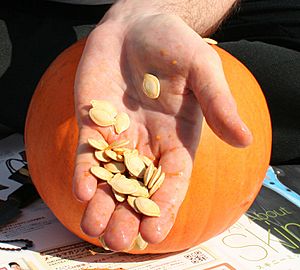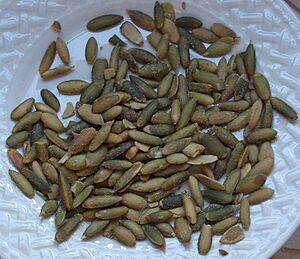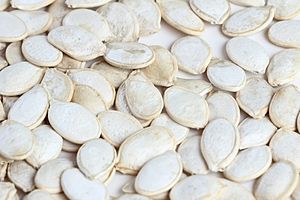Pumpkin seed facts for kids
A pumpkin seed is the edible seed found inside a pumpkin or other types of squash. In North America, these seeds are also called pepitas, which comes from a Spanish phrase meaning "little seed of squash."
Pumpkin seeds are usually flat and shaped like an oval. They have a white outer shell, called a husk. Once the husk is removed, the seed inside is light green. Some special types of squash grow seeds without husks, making them easier to eat.
These seeds are packed with good things for your body! They have lots of fat (especially healthy fats), protein, and dietary fiber. They also contain many important micronutrients like vitamins and minerals. People often roast pumpkin seeds and eat them as a tasty snack.
Eating Pumpkin Seeds
Pumpkin seeds are a popular food in Mexican cuisine. They are often roasted and enjoyed as a snack. In the United States, roasted and seasoned pumpkin seeds are a favorite autumn treat. You can also find them packaged and sold all year round, much like sunflower seeds.
In Mexico and other Latin American countries, pepitas are usually salted and sometimes spiced after roasting. You can find them in the American Southwest and in stores that sell Mexican foods.
People have been growing and eating squash for a very long time! The earliest signs of squash being grown by humans date back 8,000 to 10,000 years ago. This was even before other important crops like maize (corn) and beans were grown in the same area. Over thousands of years, people learned how to grow better squash plants.
Squash, corn, and beans became part of an ancient farming method called the Three Sisters agricultural system. These three plants grew well together and helped each other thrive.
Pumpkin seeds are also used in special Mexican sauces called mole. In these sauces, they are known as pipián. A Mexican snack made with pepitas in a special way is called pepitoría. In Greece, lightly roasted, salted pumpkin seeds with their husks are popular. They are called passatempo, which means "pastime" in Italian.
The oil pressed from roasted pumpkin seeds is also used in cooking, especially in Central and Eastern Europe. This is called pumpkin seed oil. You can even make pumpkin seeds into a nut butter, similar to peanut butter.
Nutrition and Benefits
| Nutritional value per 100 g (3.5 oz) | |
|---|---|
| Energy | 2,401 kJ (574 kcal) |
|
14.71 g
|
|
| Sugars | 1.29 g |
| Dietary fiber | 6.5 g |
|
49.05 g
|
|
| Saturated | 8.544 g |
| Monounsaturated | 15.734 |
| Polyunsaturated | 19.856 |
|
Protein
|
29.84 g
|
| Vitamins | Quantity
%DV†
|
| Thiamine (B1) |
6%
0.07 mg |
| Riboflavin (B2) |
13%
0.15 mg |
| Niacin (B3) |
28%
4.43 mg |
| Pantothenic acid (B5) |
11%
0.57 mg |
| Vitamin B6 |
8%
0.1 mg |
| Folate (B9) |
14%
57 μg |
| Vitamin C |
8%
6.5 mg |
| Vitamin E |
4%
0.56 mg |
| Vitamin K |
4%
4.5 μg |
| Minerals | Quantity
%DV†
|
| Calcium |
5%
52 mg |
| Iron |
62%
8.07 mg |
| Magnesium |
155%
550 mg |
| Manganese |
214%
4.49 mg |
| Phosphorus |
168%
1174 mg |
| Potassium |
26%
788 mg |
| Sodium |
17%
256 mg |
| Zinc |
80%
7.64 mg |
| Other constituents | Quantity |
| Water | 2.0 g |
|
Link to USDA Database entry
|
|
| †Percentages estimated using US recommendations for adults. | |
Dried and roasted pumpkin seeds are very nutritious. For every 100 grams, they contain about 49% fat, 30% protein, and 15% carbohydrates. They are also high in calories, providing a lot of energy.
Pumpkin seeds are an excellent source of many important nutrients. They provide a lot of protein, dietary fiber, niacin, iron, zinc, manganese, magnesium, and phosphorus. They also offer good amounts of riboflavin, folate, pantothenic acid, sodium, and potassium. The main healthy fats in pumpkin seeds are linoleic acid and oleic acid.
Here are some of the great things pumpkin seeds can do for your body:
- They are a good source of magnesium, potassium, and healthy fats. These help keep your bones, heart, and other body parts working well.
- Pumpkin seeds contain vitamins and fatty acids that may help people manage Type 2 diabetes.
- They are rich in zinc and other nutrients that support a healthy liver. They are also good for health during pregnancy.
- Because they are high in dietary fiber, eating pumpkin seeds can help with digestion and may assist with weight management.
- The high amount of vitamin E in pumpkin seeds helps make your immune system stronger.
- Pumpkin seeds contain a natural substance called Tryptophan. This can help you sleep better and prevent insomnia.
- They are a good source of beta-carotene, which is important for healthy skin and eyes.
Pumpkin Seed Oil
The oil made from pumpkin seeds is a special food item and an important product exported from Central Europe. It is used in cooking as a salad dressing or cooking oil.
Traditional Uses
Long ago, in traditional medicine, especially in China, pumpkin seeds were used to help get rid of certain types of parasites like tapeworms. Because of this, pumpkin seeds were even listed in a book called the United States Pharmacopoeia as a medicine against parasites from 1863 until 1936.
See also
 In Spanish: Pepita de calabaza para niños
In Spanish: Pepita de calabaza para niños
 | William Lucy |
 | Charles Hayes |
 | Cleveland Robinson |




